

Personal Development atSouthHyltonPrimaryAcademy
POLICY REVIEW DATE: SEPTEMBER 2026
POLICY LEAD: JORDAN WILSON
2025/26
HEADTEACHER: CHRISTOPHER
MITCHINSON


PERSONAL DEVELOPMENT POLICY
At South Hylton Primary Academy, we are committed to nurturing the whole child— academically, socially, emotionally, morally and spiritually—within a safe, inclusive, and aspirational environment. Our Personal Development Policy underpins our core values and vision to empower every pupil to become a confident, responsible and reflective citizen, ready to thrive in life beyond primary school. We recognise that true education extends beyond academic success. Through a broad and ambitious curriculum, rich enrichment opportunities, and dedicated pastoral care, we seek to develop pupils’ character, resilience, understanding of British values, and appreciation for diversity. We believe in equipping children not only with knowledge but with the life skills, confidence and emotional intelligence to navigate an ever-changing world with empathy and integrity. This policy outlines our whole-school approach to personal development and how it is embedded in every aspect of school life—from leadership roles to playground play, from pupil voice to safeguarding, and from careers education to our inclusive celebration of all protected characteristics. It reflects our statutory duties, and drives forward our commitment to excellence and equity for every child.
P O L I C Y S T A T E M E N T


PERSONAL DEVELOPMENT POLICY
We aim to nurture well rounded, respectful, and responsible citizens with the knowledge, skills, and character they need to thrive in a diverse and everchanging world.
We intend for pupils to:
Know how to keep themselves safe - physically, emotionally and online.
Develop positive mental health, resilience, and emotional literacy.
Build strong relationship and understand consent, boundaries and wellbeing.
Respect and value diversity, including all protected characteristics.
Understand and uphold British Values.
Access a wide range of enrichment, leadership, and aspirational opportunities.
Begin to explore the world of work and develop life-long employability skills.
Leave us confident, compassionate, and equipped for secondary school and beyond.


Curriculum
PERSONAL DEVELOPMENT POLICY
Our curriculum supports personal development through:
A well-sequenced PSHE/RSHE curriculum that includes relationships, safety, consent, mental health, physical health, and economic understanding.
A broad and inclusive RE curriculum that promotes reflection, empathy, and understanding of worldviews.
Subject links across the curriculum that promote values, safety, collaboration, and real-world application.
Safeguarding and Online Safety
We embed safeguarding in every aspect of school life:
Online safety is explicitly taught through computing and PSHE lessons.
Pupils learn how to spot risks, seek help, and use technology responsibly.
Designated Safeguarding Leads ensure the culture of safeguarding is secure, inclusive, and proactive. Visitors, workshops, and National Safer Internet Day reinforce key messages.
Personal, Social, Health and Economic Education (PSHE)
Our PSHE curriculum is designed to equip pupils with the knowledge, skills and attributes they need to manage their lives now and in the future. Through carefully sequenced lessons, we develop children’s understanding of:
Physical and mental health
Emotional literacy and regulation
Positive relationships and respect for others
Keeping safe (including online safety)
Financial awareness and economic understanding
We follow the PSHE Association framework, adapted to suit the needs and contexts of our pupils. PSHE is taught through discreet lessons, whole-school assemblies, cross-curricular links and our wider curriculum offer.
I M P L E M E N T A T I O N


Relationships and Sex Education (RSE)
PERSONAL DEVELOPMENT POLICY
RSE is a vital part of our personal development offer, rooted in the principles of respect, consent, safety, and understanding. Our RSE curriculum is age-appropriate, inclusive, and informed by statutory guidance and parental consultation. It focuses on:
Healthy relationships and family structures
The importance of respect, empathy and consent
Puberty and body changes (in upper KS2)
Challenging stereotypes and promoting equality
We create a safe and open environment where children feel confident to ask questions and explore sensitive topics in a respectful and informed way.
Religious Education (RE)
Our RE curriculum promotes an understanding and appreciation of the beliefs, values and traditions of a range of religions and worldviews. It enables children to develop spiritual awareness, respect for others, and a sense of belonging. Through RE, we aim to:
Foster tolerance, empathy and curiosity
Explore moral and philosophical questions
Encourage reflection on personal beliefs and values
Prepare pupils for life in modern Britain and a global society
We follow the locally agreed syllabus for RE, and ensure it reflects the diversity of our school and wider community.
Voice 21 – Oracy for Life
As a Voice 21 Oracy school, we recognise that spoken language is a vital tool for learning and life. Our approach to oracy is embedded across the curriculum, and supports personal development by:
Enabling pupils to express themselves clearly and confidently
Developing active listening, reasoning and critical thinking
Supporting emotional literacy and self-regulation
Encouraging respectful dialogue and collaboration
We explicitly teach oracy skills through structured talk opportunities, sentence stems, dialogic teaching, and a range of classroom talk formats including discussions, debates, storytelling and performance. Oracy is also a powerful tool in our wider work on pupil voice, democracy and leadership.
I M P L E M E N T A T I O N


PERSONAL DEVELOPMENT POLICY
SMSC and British Values
Spiritual: Reflection, wonder, and moral questioning.
Moral: Decision-making, understanding right and wrong, and consequences.
Social: Teamwork, inclusion, conflict resolution, community engagement.
Cultural: Celebrating diversity, the arts, languages, literature, and heritage.
British Values are embedded via school council elections, debates, law education, and celebration of equality and democracy.
Careers and Employability
We raise aspirations from an early age by:
Hosting Careers Week, role model visits, and inspirational speakers.
Using the Skills Builder Framework to explicitly teach skills such as teamwork, leadership, problem-solving, and aiming high.
Connecting learning to the world of work and real-life contexts.
Promoting enterprise projects and pupil leadership across the school.
Outdoor Play and OPAL (Outdoor Play and Learning)
We are committed to providing high-quality outdoor play opportunities through the OPAL Play framework, which encourages children to engage in active, imaginative, and social play in natural, stimulating environments.
OPAL supports physical development, mental wellbeing, creativity, cooperation, problem-solving, and risk management skills.
Our school playground and outdoor areas are designed to foster child-led play, promoting independence, resilience, and social interaction.
Staff are trained to facilitate and support play without unnecessary adult intervention, encouraging pupils to develop leadership and conflict resolution skills naturally.
OPAL play contributes to improved behaviour, concentration, and overall happiness, forming a vital part of our wider personal development offer.
I M P L E M E N T A T I O N


Forest School
PERSONAL DEVELOPMENT POLICY
At South Hylton Primary Academy, Forest School is an integral part of our personal development offer. Rooted in a philosophy of child-led, experiential outdoor learning, Forest School provides children with regular opportunities to explore, connect with nature, and develop confidence, resilience, and teamwork in a woodland or outdoor setting.
Forest School contributes to personal development by:
Promoting independence, perseverance, and problem-solving skills
Supporting risk-taking in a safe, supported environment
Encouraging collaboration, communication, and social interaction
Developing emotional regulation and self-awareness through calming, sensory-rich experiences
Fostering environmental responsibility and a love of the natural world
Through Forest School, children develop the confidence to face challenges, the resilience to bounce back, and the character to support others— skills which are transferable across school and life.
Rights Respecting Approach to Professional Development
Our PD policy is guided by the principles of the United Nations Convention on the Rights of the Child (UNCRC).
We are committed to being a Rights Respecting School, where children's rights are understood, respected, and promoted by all staff.
Professional development opportunities will:
Equip staff with knowledge of children’s rights and the UNCRC.
Support the consistent use of rights-respecting language and practices.
Foster a school culture rooted in dignity, equality, and mutual respect.
Encourage reflection on how rights are embedded across teaching, learning, and relationships.
Staff are expected to model rights-respecting behaviours in their interactions with pupils, colleagues, and the wider community.
PD will also support pupils in becoming active, informed citizens who understand and advocate for the rights of others.
I M P L E M E N T A T I O N


Skills Builder Framework
PERSONAL DEVELOPMENT POLICY
All staff use the Skills Builder Universal Framework to build the following core employability skills:
1.Listening
2.Speaking
3.Problem-solving
4.Creativity
5.Staying positive
6.Aiming high
7.Leadership
8.Teamwork

These are woven into curriculum tasks, assemblies, and enrichment to build lifelong learning habits.
Enrichment and Leadership
We offer a wide range of high-quality enrichment opportunities, including: After-school clubs: arts, sports, STEM, eco, coding, music, drama. Educational visits and residentials to expand horizons.
Pupil roles: School Council, Eco-Team, House Captains, Digital Leaders, and Worship Leaders.
Themed weeks: Anti-Bullying Week, Black History Month, World Book Day, Children's Mental Health Week.
Forest School and outdoor learning for team-building and self-confidence.
We ensure all pupils—regardless of background—have equitable access to these experiences.
I M P L E M E N T A T I O N


Mental Health and Emotional Wellbeing
We create a culture of care and openness:
PERSONAL DEVELOPMENT POLICY
Trained ELSAs, pastoral staff, and SEND support.
Worry boxes, mindfulness activities, and check-ins.
PSHE teaching supports self-regulation, emotional literacy, and confidence.
Strong transitions, support systems, and mental health signposting.
Pupil Voice & Leadership
Pupils have genuine influence through School Council, Eco-Committee, Worship Leaders, Playground Buddies, and other leadership roles.
Regular forums and surveys gather pupil views on curriculum, wellbeing, and school life, ensuring their voice shapes our provision.
Leadership opportunities foster confidence, responsibility, and democratic engagement.
Enrichment & Wider Opportunities
Extensive extracurricular clubs and activities promote creativity, sport, STEM, the arts, and environmental awareness. Educational visits, residential trips, and visitors broaden cultural capital and real-world learning.
The school celebrates themed weeks and events such as Anti-Bullying Week, Mental Health Awareness Week, and Black History Month.
Careers education and aspirations are introduced progressively, with career fairs, role models, and links to the world of work.
I M P L E M E N T A T I O N


Equality, Diversity & Inclusion
PERSONAL DEVELOPMENT POLICY
We celebrate and embed diversity across curriculum, culture, and community.
Teaching explicitly addresses protected characteristics (age, disability, gender reassignment, marriage and civil partnership, pregnancy and maternity, race, religion or belief, sex, sexual orientation) to promote understanding and challenge discrimination.
We ensure equitable access to learning, enrichment, and leadership opportunities for all pupils.
Anti-discrimination is a clear expectation with prompt, restorative responses to incidents.
Roles & Responsibilities
Governing Body oversees policy compliance and effectiveness through monitoring and evaluation.
The Headteacher and SLT lead strategy, allocate resources, and ensure statutory requirements are met.
The Personal Development Lead coordinates curriculum, enrichment, pupil voice, and wellbeing initiatives.
All staff model and promote personal development values, support safeguarding, and foster positive relationships.
Pupils take active roles as leaders and contributors.
Parents and carers are partners in promoting wellbeing, safety, and character.
I M P L E M E N T A T I O N


School
Food Bank - Fair Share Partnership
PERSONAL DEVELOPMENT POLICY
At South Hylton Primary Academy, we are proud to be part of the Fare Share initiative, helping to reduce food waste and support families in our community.
What is Fare Share?
Fare Share is a national charity that redistributes surplus food from supermarkets and suppliers to local schools and community organisations. This helps ensure good food doesn't go to waste and supports families who may need a little extra help.
How Our School Takes Part:
We receive regular deliveries of food items through Fare Share. These are made available to families via our school food bank. All families are welcome to access this service—no referral is needed
Our Aims:
To reduce food waste by making good use of surplus food.
To support the wellbeing of our school community.
To promote kindness, dignity, and inclusivity.
How to Access or Contribute:
The food bank is open every Monday after school. Families can collect items discreetly no forms, no fuss. Donations of additional long-life items are also welcome from staff a

I M P L E M E N T A T I O N


PERSONAL DEVELOPMENT POLICY
We measure success by the extent to which pupils:
Show respect, empathy, and positive behaviour.
Understand how to stay safe and make informed choices.
Demonstrate confidence, resilience, and aspiration.
Embrace opportunities to lead, contribute, and explore interests.
Engage with issues of equality, justice, and citizenship.
Transition to secondary school as well-rounded, respectful individuals.
We evaluate impact through:
Pupil voice and wellbeing surveys
Monitoring of PSHE/RSHE and SMSC provision
Behaviour, attendance, and safeguarding data
Engagement with clubs, visits, and leadership
Feedback from parents, staff, and governors
Inclusion data and support impact
Monitoring and Review
The Personal Development Lead, Senior Leadership Team, and Governors monitor provision and outcomes through:
Curriculum audits, learning walks, and observations
Assemblies and pupil presentations
Regular review of enrichment participation
Evaluation of pupil and family voice
This policy is reviewed annually in line with updates to statutory RSHE, Ofsted guidance, and school development planning.

2025/26 PERSONAL DEVELOPMENT CALENDAR
BRITISH VALUES
SCHOOL VALUES
PERSONAL DEVELOPMENT CURRICULUM
The Rule of Law and Democracy
Good - We are good to each other and the world around us
Mutual Respect and Tolerance Brave - we do hard things
Mutual Respect and Tolerance/The Rule of Law
Curious - We ask why? what if?
Individual Liberty
The Rule of Law
Fast - We make things happen, respond quickly to challenges and seize opportunity.
Individual Liberty
Determined - We don’t give up Democracy Individual Liberty
Ambitious - We dream big
PSHE & RSE Wellbeing
PERSONAL DEVELOPMENT CURRICULUM
Outdoor Learning Day
LEADERSHIP School Council
OPAL Play Leaders
Digital Leads
Peer Mentors
Sports Leaders
Eco Leaders
Family and Relationships
Anti-Bullying Week
Health and Wellbeing
Children’s Mental
Health Week
Safer Internet Day
Safety and the changing body
School Council
OPAL Play Leaders
Digital Leads
Peer Mentors
Sports Leaders
Eco Leaders
School Council
OPAL Play Leaders
Digital Leads
Peer Mentors
Sports Leaders
Eco Leaders
School Council
OPAL Play Leaders
Digital Leads
Peer Mentors
Sports Leaders
Eco Leaders
School Council
OPAL Play Leaders
Digital Leads
Peer Mentors
Sports Leaders
Eco Leaders
School Council
OPAL Play Leaders
Digital Leads
Peer Mentors
Sports Leaders
Eco Leaders
PERSONAL DEVELOPMENT CURRICULUM
SKILLS BUILDER Listening Skills Speaking
CAREERS
ONLINE SAFETY Self image and identity
Exlporing the difference between online and offline identity
Online relationships How technology shapes communication styles
Safer Internet Day
Online reputation and managing online information
Explore how online information can be used to make judgements How online information is found, viewed and interpreted
Online Bullying
How technology impacts bullying Effective reporting and intervention
Health Wellbeing and Lifestyle Explores the impact technology has on health and wellbeing including mood, sleep, body and relationships.
Privacy and Security
Explore how to keep personal information safe and how it may be used or stored online.
TRIPS AND VISITS
What?
PERSONAL DEVELOPMENT CURRICULUM
Spiritual Development Moral Development Social Development Cultural Development
Explore beliefs and experience; respect faiths, feelings and values; enjoy learning about ourselves, others and the surrounding world; use imagination and creativity to reflect.
Recognise right and wrong; respect the law; understand consequences; investigate moral and ethical issues; offer reasoned views and have an appreciation of British Values.
Investigate Moral Issues; appreciate diverse viewpoints; participate, volunteer and cooperate; resolve conflict; engage with the fundamental values of British Democracy.
Appreciate cultural influences; appreciate the role of Britian’s parliamentary systems; participate in culture opportunities; understand, accept, respect and celebrate diversity.
How?
Assemblies
RE and PSHE Curriculum
Celebration of events
Charity Fundraising
Behaviour Policy
School Values
Visits to religious buildings
Speakers/visitors in
assembly
Skills Builder
Voice 21
Behaviour Policy
Debates
School Council
Leadership opportunities
Play Leaders
E-Safety Lessons
PSHE Curriculum
Anti-bullying week
Positive praise
National Events and celebrations
FAB Fridays
Skills Builder
Voice 21
Behaviour Policy
Play Leaders
OPAL Play
Sports Week
Community Events
Paired Talk (Talk Partners)
Fundraising events
Whole School Assemblies
Extra-curricular Activities
After School Clubs
School Community Events
Skills Builder
Voice 21
Protected characteristic
Sharing stories (windows and mirrors)
Trips and Visits
RE Curriculum
Book Corners (reflecting realities)
Whole School Assemblies
Celebrating Nationals and International Events
School Events
History Curriculum
Geography Curriculum
Displays
Skills Builder
Voice 21

Enrichment Activities:
ENRICHMENT
Lunchtime and after-school clubs (e.g. sports, arts, STEM, and eco-clubs) that cater to a wide range of interests and abilities. Some recent examples of these are: Football; Football Frisbee; Curling; Kielder Observatory Astronomy club; Art Club; Skills Builder and multi-skills.
School trips and residential visits broaden pupils’ horizons and build cultural capital. We carefully map these out each year, linking them to the curriculum. We also provide parents and children with the SHPA Passport a range of activities and opportunities, which help build character (i.e. residential and camping trips)
Special events such as ‘Rainbow Day - proud to be me day’, Black History month, careers week, anti-bullying week, mental health day and other such events have become staples of our annual calendar.
Children from Yr2 up are given strong themes to produce short videos on for assemblies i.e. Anti-bullying week, different religious themes, fundamental British values etc. (these can all be found on our YouTube channel).
E N R I C H M E N T

Monday
Multi-skills with Mr Football
AUTUMN
Multi Skills with Mr Football
SPRING
Multi Skills with Mr Football
SUMMER
ENRICHMENT - CLUB OFFER
Skills builder
Music with Mr Potter
Lunchtime - Choir
Skills Builder
Dance wtih Pinky from Dance Jam
Skills builder
Music with Mr Potter
Curling Club
Lunchtime - Choir
Skills Builder
Dance wtih Pinky from Dance Jam
Skills Builder Frisbee Football from January
Skills Builder Football with Mr Footbal
Skills builder
Music with Mr Potter
Curling Club
Lunchtime - Choir
Skills Builder
Dance wtih Pinky from Dance Jam
Skills Builder Frisbee Football
Astronomy Club (YR 5/6)
Skills Builder Football with Mr Footbal
Skills Builder Frisbee Football
Skills Builder Football with Mr Footbal

PERSONAL DEVELOPMENT
At South Hylton Primary Academy we strongly believe in empowering our pupils to become active participants in their education and school community. Our Pupil Leadership Structure provides meaningful opportunities for children to develop confidence, responsibility, and leadership skills, while contributing positively to the life and culture of the school.
Objectives of Pupil Leadership
To develop pupils’ self-confidence, communication, and teamwork skills.
To foster a sense of ownership and pride in the school environment.
To encourage democratic participation and respect for others’ views.
To support the personal development and wellbeing of all pupils.
To provide pupils with a platform to influence decision-making and school improvement.
Selection and Training
Leadership roles are advertised clearly and open to all pupils. Where appropriate, elections are held to encourage democratic engagement.
Pupils receive induction and ongoing training tailored to their responsibilities, including communication skills, teamwork, and safeguarding awareness.
Leaders meet regularly with a designated staff member for guidance and reflection.
Pupil Voice and Influence
Leadership groups provide formal channels for pupil voice and feed into school decision-making.
Feedback from leadership representatives is shared with Senior Leaders and Governors.
Pupils influence areas such as behaviour policies, school environment improvements, and enrichment activities.
P U P I L
L E A D E R S H I P


Leadership Roles and Responsibilities
1.
School Council
PERSONAL DEVELOPMENT
Representatives are elected from each class annually by their peers.
They meet regularly with staff to discuss school issues, propose improvements, and organize school-wide events.
Members promote school values and gather feedback from their classmates.
2. Eco-Committee
Pupils passionate about environmental issues join to lead sustainability initiatives.
Responsibilities include promoting recycling, energy saving, and biodiversity projects. They organize awareness campaigns and liaise with the local community.
3. OPAL Play / Peer Mentors
Older pupils help younger children during playtimes to promote safe and inclusive play.
They assist with conflict resolution and model positive behaviour.
Ensure OPAL equipment is tidied away correctly.
Ensure OPAL equipment is safe to use.
4. Digital Leaders
Pupils with interest and skills in technology support safe and responsible use of digital devices. They help raise awareness of online safety and support ICT events.
P U P I L
L E A D E R S H I P


5. Sports Leaders
PERSONAL DEVELOPMENT
Responsible for fostering teamwork and sportsmanship during competitions and house events.
They motivate peers to participate actively in physical activities and school events.
Help/support with Sports Day Events.
6. Mini Police
Selected pupils work in partnership with the local police to learn about community safety, law, and citizenship.
They take part in projects such as road safety campaigns, school patrols, and awareness events.
Mini Police act as positive role models, promoting respect, responsibility, and community engagement.
7. Librarians
Appointed from Key Stage 2, Librarians help manage the school library by organising books, assisting pupils in finding reading material, and promoting good library habits.
They support reading events and help maintain a welcoming, tidy library space.
Librarians encourage a love of reading and help younger pupils develop independence in using the library.
8. SEND Ambassadors
As part of our school’s Professional Development (PD) policy, we are proud to introduce the role of SEND Ambassadors within our pupil leadership team. These students will represent the voice of learners with special educational needs and disabilities, helping to promote inclusion, raise awareness, and contribute to the development of teaching strategies that support all learners. Through regular collaboration with staff, SEND Ambassadors will play a key role in shaping a more supportive and understanding school environment.
P U P I L
L E A D E R S H I P


Leadership Roles and Responsibilities
SCHOOL COUNCIL
School Council Representative
Role Purpose:
To represent their class’s views and opinions at School Council meetings, contribute ideas for school improvements, and help organize school-wide events.
Key Responsibilities:
Attend regular School Council meetings.
Gather ideas and feedback from classmates.
Share the School Council’s decisions with their class.
Help plan and support school events and initiatives.
Promote positive behaviour and school values.
Skills Developed:

Communication, teamwork, responsibility, leadership, problem-solving.
P U P I L L E A D E R S H I P


Leadership Roles and Responsibilities
Eco-Committee Member
Role Purpose:

To lead environmental initiatives and promote sustainability within the school and local community.
Key Responsibilities:
Promote recycling and waste reduction.
Encourage energy saving and water conservation.
Organize environmental awareness campaigns.
Monitor and improve biodiversity in the school grounds.
Liaise with staff and local community groups about environmental projects.
Skills Developed:
Environmental awareness, teamwork, project management, communication.
P U P I L
L E A D E R S H I P


Leadership Roles and Responsibilities
OPAL PLAY / PEER MENTOR
OPAL Play / Peer Mentor
Role Purpose:
To support younger pupils during playtimes by encouraging safe, friendly, and inclusive play.
Key Responsibilities:
Help younger children resolve minor conflicts peacefully. Encourage positive play and friendships. Model good behaviour and kindness. Report any serious concerns to a member of staff.
Skills Developed: Conflict resolution, empathy, leadership, responsibility.

P U P I L
L E A D E R S H I P


Leadership Roles and Responsibilities
DIGITAL LEADER
Digital Leader
Role Purpose:
To support safe and responsible use of technology and promote online safety across the school.
Key Responsibilities:
Help raise awareness about online safety among pupils.
Support staff and pupils with digital projects and ICT events.
Promote responsible use of devices and internet.
Provide feedback on digital resources and infrastructure.
Skills Developed: ICT skills, communication, responsibility, teamwork.

P U P I L
L E A D E R S H I P


Leadership Roles and Responsibilities
SPORTS LEADER
Sports Leader
Role Purpose:
To foster team spirit and encourage participation and good sportsmanship during house competitions and sporting events.
Key Responsibilities:
Motivate peers to participate in sports and house events.
Help organize and lead team activities and competitions.
Model fair play and respect in sports.
Support sports clubs and represent the school in events.
Skills Developed:
Leadership, teamwork, motivation, organisation.

P U P I L L E A D E R S H I P


Leadership Roles and Responsibilities
Mini Police
Role Purpose:
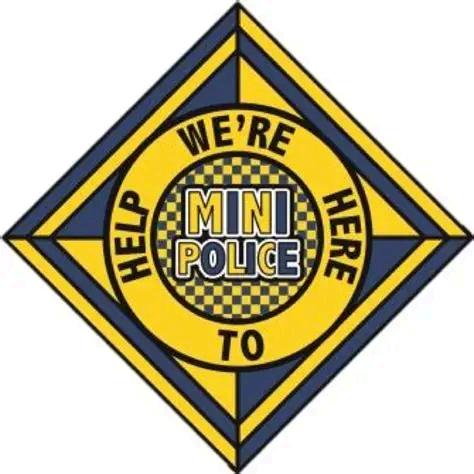
To promote safety, good citizenship, and community awareness by working in partnership with local police.
Key Responsibilities:
Take part in community projects and safety initiatives (e.g. road safety, anti-bullying).
Represent the school in events with local police and community groups.
Share safety messages with peers through assemblies or class talks.
Act as a role model by demonstrating respect, responsibility, and good behaviour.
Skills Developed:
Confidence, communication, responsibility, community awareness.
P U P I L L E A D E R S H I P


Leadership Roles and Responsibilities
LIBRARIANS
Librarians
Role Purpose:
To support the running of the school library and promote a love of reading across the school.
Key Responsibilities:
Help organise and tidy books and reading areas.
Assist other pupils in choosing and borrowing books.
Promote reading events such as Book Week or author visits.
Encourage respect for books and responsible library use.
Skills Developed: Organisation, responsibility, communication, leadership.

P U P I L
L E A D E R S H I P


CAREERS EDUCATION
At South Hylton Primary Academy, we believe it’s never too early to start inspiring children about their future. As part of the North East Ambition Primary Network, we are committed to embedding high-quality careers-related learning across the curriculum.
Our Approach to Careers Education:
We introduce pupils to a wide range of jobs and career pathways to broaden their horizons and raise aspirations.
Careers learning is age-appropriate, engaging, and linked to real-life experiences.
We help pupils understand the world of work, the value of different roles in society, and the skills they are already developing for the future.
What This Looks Like in School:
Careers-themed days and employer visits
Links to careers in curriculum subjects
Classroom discussions about hopes, dreams, and future goals
Opportunities to meet people from a range of professions
Use of resources from the North East Ambition Primary Toolkit and MYPATH
Engagement with local businesses, colleges, and community partners
Our Aims:
Raise aspirations for all pupils, regardless of background
Challenge stereotypes around jobs and gender
Develop key skills such as communication, teamwork, and problem-solving
Build confidence and ambition from an early age
We are proud to help our pupils begin to explore the exciting opportunities that lie ahead and support them to dream big and aim high.
R A I S I N G A S P I R A T I O N S


CAREERS EDUCATION
Careers Education and Raising Aspirations
As part of our commitment to preparing pupils for their future lives, we are proud to be members of the North East Ambition Primary Careers Network. Through this partnership, we embed early careers-related learning across our curriculum, supporting children to understand the connection between their learning, their talents, and the world of work. Our approach is aligned with the Gatsby Benchmarks, particularly:
Benchmark 1: A stable careers programme – We deliver a coherent, age-appropriate programme that grows with our pupils and is embedded into our personal development and wider curriculum.
Benchmark 2: Learning from career and labour market information – Pupils are introduced to a wide range of careers and real-world opportunities through books, visitors, themed weeks, and experiences that reflect the local and national job market.
Benchmark 3: Addressing the needs of each pupil – Our careers provision is inclusive and aspirational, actively challenging stereotypes and raising ambitions for all learners.
Benchmark 4: Linking curriculum learning to careers – Teachers make meaningful links between subjects and real-world contexts, helping children see the relevance of their learning. Through role play, storytelling, visitors, and community links, we ensure children begin to develop an awareness of different jobs, pathways, and possibilities, laying the foundations for confident, informed choices in later life.
R A I S I N G A S P I R A T I O N S


WELLBEING AND MENTAL HEALTH
Promoting Well-being and Mental Health
Pastoral Support: We offer a nurturing environment with access to well-trained staff who support pupils’ emotional and mental health. This includes a dedicated Welfare Lead who can work with both parents and children and we have access to an NHS Mental Health Nurse twice a week, who can deliver bespoke programs to support children.
Mental Health Education: Pupils learn strategies for self-regulation, stress management, and emotional literacy through our character curriculum and commitment to Mental Health. We have earned several awards for our mental health commitment towards both staff and children including the Optimus award and the Sunderland Mental Health award.
Parental Engagement: Regular workshops and resources are provided to support families in promoting well-being at home. We run termly parental events and assemblies. We also offer regular ‘drop-in’ sessions in our community room covering everything from anti-bullying, SEND and mental health to simply just having access to a warm space in the winter. We also offer parental access to an on-sight foodbank in conjunction with Fare-Share and access to Christmas presents through local charities.
Emotional wellbeing
Evidence suggests that a small improvement in wellbeing can help to decrease some mental health problems and also help people to flourish, therefore we have adopted the 5 ways to wellbeing project, this sets out 5 actions to improve personal wellbeing: Connect– connecting with others
Give– giving – looking outward as well as inward Take Notice– taking notice of the world around you
Keep Learning– learning new things
Be Active– doing something active
Pupils will have the opportunity to learn and embrace these 5 ways to enhance their wellbeing throughout the school environment and this will be embedded into their learning in PSHE.
At SHPA we have an Education Mental Health Practitioner, Abbie Bewick, who will be in school each Thursday to work with targeted children either individual or as specific group interventions. Some of the interventions Abbie will be delivering are the ‘Friends Intervention’ and Anxiety Awareness.
W E L L B E I N G A N D M E N T A L H E A L T H


WELLBEING AND MENTAL HEALTH

W E L L B E I N G A N D M E N T A L H E A L T H


Behaviour and the Good to Be Green System
GOOD TO BE GREEN
At South Hylton primary Academy, we believe that positive behaviour is essential for creating a happy, safe, and productive learning environment. Our Good to Be Green system helps encourage and celebrate respectful, kind, and responsible behaviour among all our students.
How the Good to Be Green System Works:
Every child starts each day with a green card, which means they are “Good to Be Green.”
Throughout the day, children who follow our school rules and demonstrate positive behaviour keep their green card. If a child’s behaviour causes concern, they will receive a gentle reminder or warning. If inappropriate behaviour continues, the child’s card may change from green to yellow or red, helping them understand the importance of making better choices.
Teachers work closely with students to help them reflect on their behaviour and make improvements. Children who stay “Good to Be Green” all day or week are recognised and rewarded with praise, certificates, or special privileges.
Our goal is to support every child in making positive choices, understanding the impact of their actions, and taking responsibility for their behaviour. We encourage parents and carers to work with us to reinforce these values at home, ensuring that all children thrive both academically and socially.
G O O D T O B E G R E E N



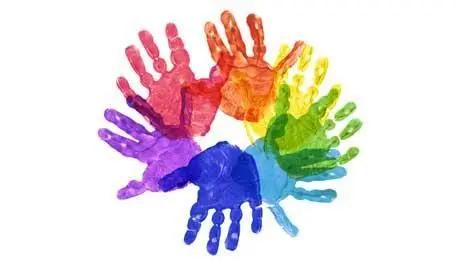
PSHE/RSE CURRICULUM

NORTH EAST
AMBITION CAREERS

OPAL DOCUMENTATION

PRIMARY NETWORK RIGHTS RESPECTING

CAREERS DOCUMENTATION

ORACY - VOICE 21
CURRICULUM

SKILLS BUILDER

RE CURRICULUM
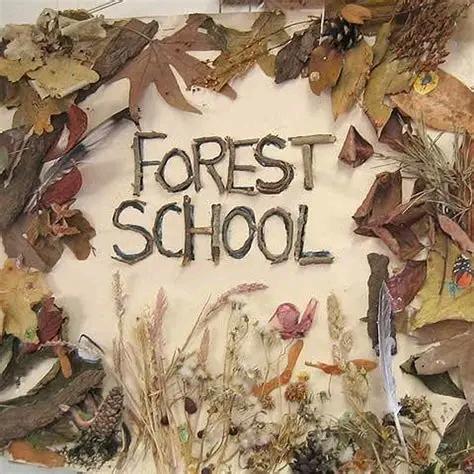
FOREST SCHOOL
DOCUMENTATION
C U R R I C U L U M
L I N K S


WINDOWS AND MIRRORS








SCHOOL VALUES



PERSONAL DEVELOPMENT
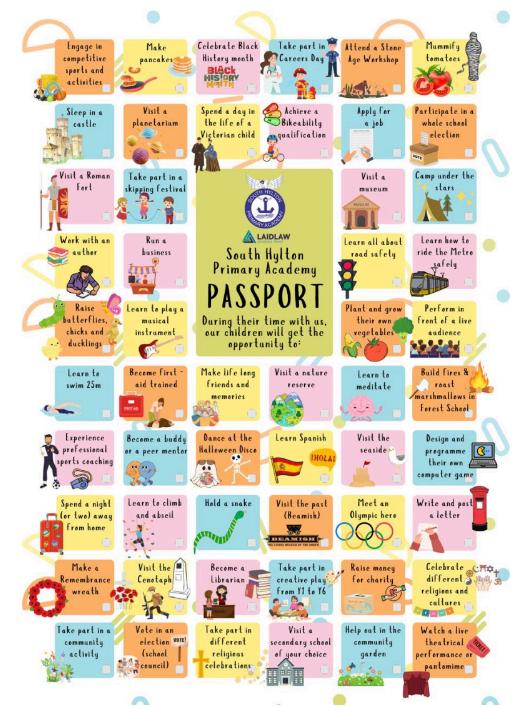
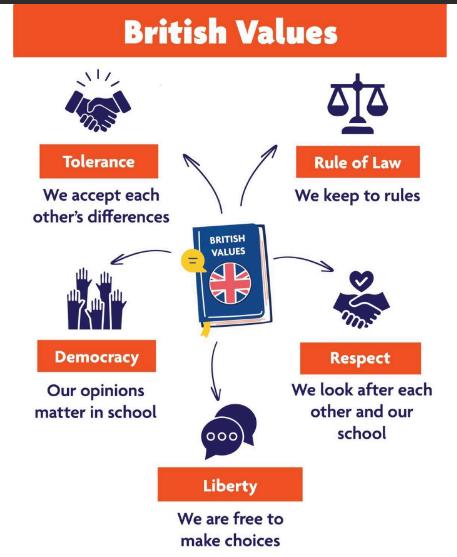


PERSONAL DEVELOPMENT
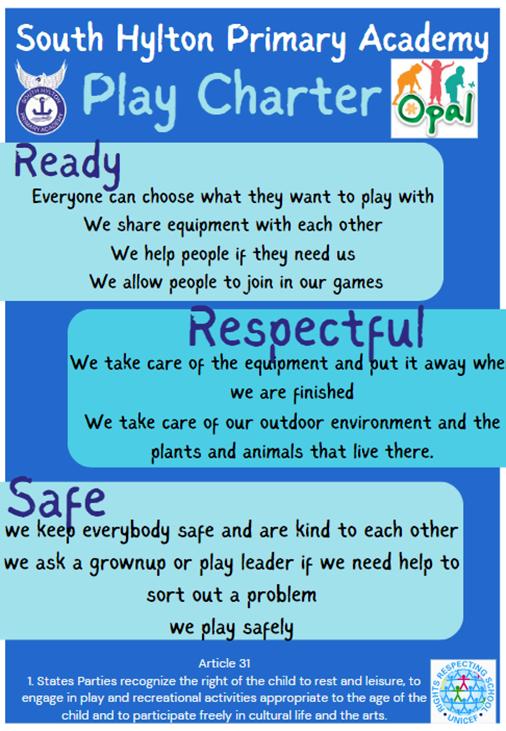




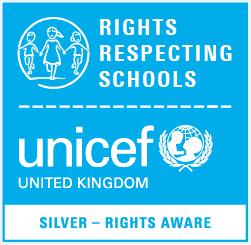

AWARDS









